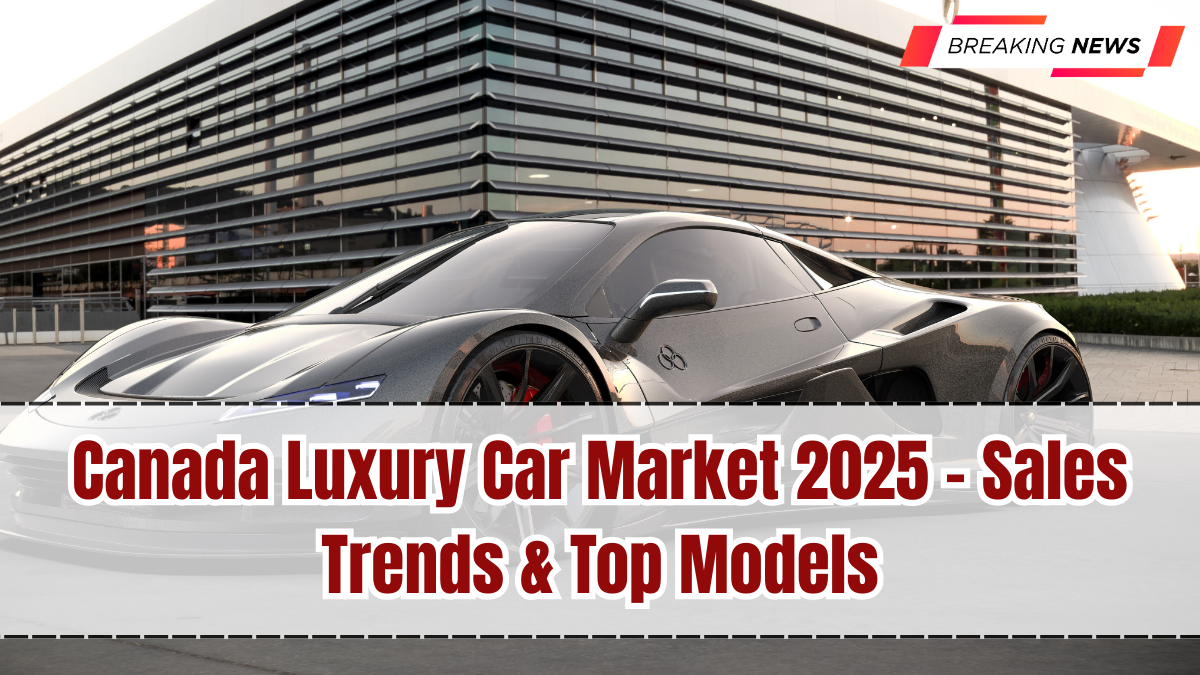The Canada Luxury Car Market 2025 is witnessing record growth, with premium vehicles capturing more attention than ever before. From stylish sedans to high-tech electric SUVs, Canadians are showing a strong appetite for cars that blend performance, comfort, and advanced features.
This trend reflects more than just a taste for luxury—it signals changing lifestyles, stronger consumer confidence, and the rise of electric and hybrid luxury options. While affordability challenges remain, luxury car sales are outpacing expectations in 2025.
So, which brands are leading the way, what models are most popular, and what explains Canada’s growing love affair with luxury vehicles?

Why Are Luxury Car Sales Rising in 2025?
Several factors are fueling the boom in luxury car sales.
First, Canada’s economy has stabilized after years of inflationary pressure, boosting consumer spending power. High-income professionals and business owners are investing in premium vehicles as status symbols and lifestyle upgrades. Second, luxury brands are expanding into the hybrid and EV market, offering eco-friendly models without compromising comfort.
Finally, leasing programs are making luxury vehicles more accessible. Many Canadians who could not afford to buy outright now lease BMWs, Mercedes, or Lexus models with manageable monthly payments.
Which Luxury Brands Dominate the Canadian Market?
A few key players lead Canada’s luxury car sales.
BMW continues to dominate with its mix of sporty sedans and crossovers, including the BMW 3 Series and X5 SUV. Mercedes-Benz remains a close competitor, with models like the GLC and E-Class capturing significant sales. Lexus has carved out a strong position with its reliability and hybrid lineup, appealing to eco-conscious buyers.
Meanwhile, Audi and Porsche see rising demand among younger professionals who want performance with style. Tesla also maintains a solid share in the luxury EV market with its Model S and Model X.
Which Models Are the Best-Sellers in 2025?
Several models stand out as Canada’s top luxury choices.
The BMW X3 is a favorite among urban professionals, combining compact size with high-end features. The Mercedes-Benz GLC appeals to families wanting luxury in a practical SUV form. For sedans, the Lexus ES and BMW 5 Series remain top sellers.
On the electric side, the Tesla Model Y and Audi Q8 e-tron are leading the luxury EV race, reflecting Canada’s growing push toward sustainable mobility.
How Are EVs and Hybrids Changing the Luxury Segment?
Sustainability is reshaping the definition of luxury.
Luxury buyers are increasingly looking for green options, pushing brands like BMW, Mercedes, and Audi to launch premium EVs and hybrids. The BMW iX, Mercedes EQE, and Audi e-tron series are attracting buyers who want eco-friendly tech wrapped in elegance.
These vehicles offer not just performance but advanced features like AI-powered driver assistance, ultra-fast charging, and futuristic interiors. For many Canadians, luxury now means innovation as much as comfort.
What Role Does Technology Play in Luxury Cars?
Technology has become the centerpiece of the luxury market.
From digital dashboards and AI-powered infotainment to autonomous driving features, luxury vehicles in 2025 are high-tech machines. Advanced safety systems such as lane assist, adaptive cruise control, and automatic emergency braking are standard in most premium models.
Luxury interiors now include smart climate control, voice-command systems, and premium sound experiences. These features set luxury cars apart from mainstream vehicles, justifying their higher price tags.
How Do Leasing and Financing Impact Sales?
Leasing programs are making luxury cars accessible to a wider audience.
Dealers report that more than 60% of luxury vehicles in 2025 are leased rather than purchased outright. This allows Canadians to enjoy premium cars with lower upfront costs. Flexible financing and subscription-based ownership models are also gaining traction, especially among younger professionals.
This shift ensures that luxury brands maintain strong sales even in uncertain economic climates.
Are There Regional Trends in Luxury Car Sales?
Yes, luxury sales vary by province.
Ontario and British Columbia lead luxury car purchases, driven by high-income urban centers like Toronto and Vancouver. Quebec follows closely, with Montreal showing strong demand for both luxury SUVs and electric models. Alberta, fueled by its energy-driven economy, sees high demand for larger premium trucks and SUVs.
Smaller provinces also report growing sales, but luxury vehicles remain concentrated in urban and wealthier regions.
Conclusion
The Canada Luxury Car Market 2025 reflects changing consumer behavior. Canadians are not only buying more luxury cars but also redefining what luxury means—combining comfort with sustainability, technology, and style.
Brands like BMW, Mercedes, Lexus, and Tesla are setting the pace, while leasing options make luxury more accessible. As EVs and hybrids gain ground, the future of Canada’s luxury market looks innovative, greener, and stronger than ever.
FAQs
Why are luxury car sales rising in Canada in 2025?
Because of higher consumer confidence, eco-friendly options, and attractive leasing programs.
Which luxury brands are leading the market?
BMW, Mercedes-Benz, Lexus, Audi, and Tesla dominate sales.
What are the most popular luxury models in 2025?
The BMW X3, Mercedes GLC, Lexus ES, Tesla Model Y, and Audi Q8 e-tron top the list.
Are EVs important in the luxury segment?
Yes, luxury buyers are demanding electric and hybrid SUVs and sedans with advanced tech.
Do most Canadians buy or lease luxury cars?
Most lease their vehicles, with leasing accounting for over 60% of luxury sales in 2025.
Click here to know more.
